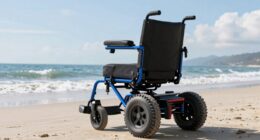Have you ever considered the delicate balance between life and dehydration in patients receiving hospice care?
The question of how long these individuals can survive without water lingers in the air, drawing our attention to a crucial aspect of end-of-life care.
As we explore this topic further, we uncover the complexities surrounding hydration in hospice settings and the profound implications it carries for those nearing the end of their journey.
Key Takeaways
- Dehydration hastens death in hospice patients.
- Factors like pain hinder water intake.
- Proper hydration supports comfort and dignity.
- Terminal dehydration impacts well-being and quality of life.
Dehydration and Hospice Patients
Dehydration in hospice patients can have significant impacts on their comfort and symptoms as they approach the end of life. It's crucial to recognize that dehydration can lead to distressing symptoms such as delirium and altered serum sodium levels in these vulnerable patients. Despite the common belief that dehydration induces thirst, hospice patients often don't exhibit this sensation during the dying process. The withdrawal of water from these patients is a delicate decision, as it can hasten death within a short timeframe.
During this critical time, hospice patients commonly experience a loss of appetite and may refuse food and fluids. To address the discomfort associated with dehydration, oral care becomes paramount in maintaining their quality of life. Ensuring proper oral hygiene can help alleviate dryness in the mouth, promoting a sense of comfort for the patient. By understanding the implications of dehydration in hospice care, we can strive to provide compassionate support and alleviate suffering for these individuals.
Factors Affecting Water Intake

Considering the delicate nature of water intake in hospice patients, understanding the various factors influencing their hydration levels is essential for providing compassionate care.
- Hydration Status: The individual's overall hydration status, underlying medical conditions, and medications can significantly impact their water intake in hospice care.
- Swallowing Ability: Dehydration can be influenced by the patient's ability to swallow, making it challenging for them to take in fluids adequately.
- Cognitive Impairment: Conditions like dementia can affect a hospice patient's ability to recognize and respond to thirst cues, leading to reduced water intake.
- Symptom Management: Pain, nausea, and other symptoms common in hospice patients can hinder their willingness or ability to drink water, necessitating tailored interventions to address these issues.
In the compassionate care of hospice patients, monitoring and addressing factors such as dry mouth, oral health, and overall comfort play a crucial role in ensuring optimal water intake. By recognizing and managing these influential factors, healthcare providers can strive to support the hydration needs of individuals under hospice care effectively.
Hydration Impact on End-of-Life
Understanding the critical role of hydration in end-of-life care for hospice patients is paramount for ensuring comfort and quality of life during this sensitive time. Dehydration significantly impacts the well-being of hospice patients, affecting internal balance and cell function.
As patients near the end of life, their ability to survive without water diminishes, often lasting only a few days. Hydration monitoring becomes crucial in this stage to manage symptoms like delirium and altered sodium levels, which can signal the approaching end.
Terminal dehydration, a common occurrence in hospice care, may not induce thirst but can manifest as dryness in the mouth, a sign of the dying process. Despite the loss of appetite and decreased desire for fluids, proper hydration management remains essential to support hospice patients' comfort and overall well-being during this challenging period.
Survival Period Without Water

As we explore the survival period without water, it becomes evident that an individual's ability to endure without this essential resource is limited, typically averaging around three days. Understanding the impact of dehydration on hospice patients is crucial for providing quality end-of-life care.
- Dehydration Effects: Dehydration can lead to a decline in overall health and quality of life for hospice patients. It can exacerbate symptoms like fatigue, confusion, and discomfort.
- Survival Time Variation: The average survival time without water can vary based on individual water needs and intake. Factors such as age, health status, and environmental conditions play a role in determining how long a person can survive without water.
- Terminal Dehydration: In end-of-life situations, where individuals are using minimal energy, the survival period without water may be shortened to just a few days. This emphasizes the importance of managing hydration levels in hospice care.
- Compassionate Care: Providing adequate hydration and addressing individual water needs is essential in ensuring comfort and dignity for hospice patients as they near the end of their lives.
Understanding Dehydration in Hospice
Dehydration in hospice patients can have significant impacts on their comfort and overall well-being as they approach the end of life. It is essential to understand that terminal dehydration, common in hospice care, may lead to delirium and altered serum sodium levels. Unlike in other situations, terminal dehydration does not usually create a sensation of true thirst in patients. Withdrawing water from a hospice patient can result in imminent death within hours or a few days, highlighting the importance of managing dehydration symptoms effectively. As part of the dying process, it is common for patients to experience a loss of appetite and thirst. Providing oral care becomes crucial in alleviating dryness and enhancing the comfort of hospice patients during this challenging time. By recognizing the complexities of dehydration in hospice care, we can better support patients in managing their symptoms and enhancing their quality of life as they navigate the end-of-life journey.
| Keyword | Definition | Importance |
|---|---|---|
| Dehydration | Lack of adequate fluids in the body, leading to various complications | Vital for comfort and well-being |
| Altered serum sodium levels | Imbalance in the body's electrolytes due to dehydration | Can result in serious health issues |
| Managing symptoms | Providing care to alleviate discomfort and improve overall quality of life | Essential for enhancing patient comfort |
Frequently Asked Questions
What Are Common Symptoms in the Last 48 Hours of Life?
In the last 48 hours of life, common symptoms include decreased alertness, difficulty swallowing, changes in breathing patterns, skin color changes like mottling, and increased restlessness. These signs indicate the body is preparing for the end of life.
It's important to provide comfort and support to the individual and their loved ones during this time. Understanding these symptoms can help in providing the best care possible in these final moments.
What Are the 4 Stages of Death in Hospice Patients?
When we talk about the 4 stages of death in hospice patients, we delve into the emotional journey they undergo.
Denial, anger, bargaining, and acceptance are key aspects, each reflecting unique ways of coping with impending death.
These stages, part of the Kübler-Ross model, help caregivers understand and support patients through this challenging time.
It's a profound process where individuals navigate their feelings as they come to terms with their mortality.
What Are the Stages of the Body Shutting Down?
As the body shuts down, hospice patients go through stages that signal the natural progression towards the end of life. These stages include decreased consciousness, reduced responsiveness, and slowed systems like circulation and organ function. Signs of dehydration, such as dry mouth and decreased urine output, may be present.
Understanding these stages can help us provide empathetic care and support to those in hospice.
How Do Hospice Nurses Know When Death Is Near?
When death is near, hospice nurses recognize signs like decreased responsiveness, changes in breathing, and skin color alterations.
We monitor vital signs and observe for symptoms like restlessness or decreased urine output.
Our focus is on providing comfort and support to both the patient and their loved ones during this delicate time.
We aim to ensure a peaceful and dignified transition as the end of life approaches.
Conclusion
In the final stages of life, hospice patients can live for a few days to weeks without water. While hydration is crucial, individual circumstances can impact survival without water.
Understanding dehydration symptoms and monitoring hydration levels is essential for providing comfort and quality of life.
Just as a river flows effortlessly towards the sea, hospice care navigates the delicate balance of ensuring a peaceful journey for patients as they approach the end of life.









